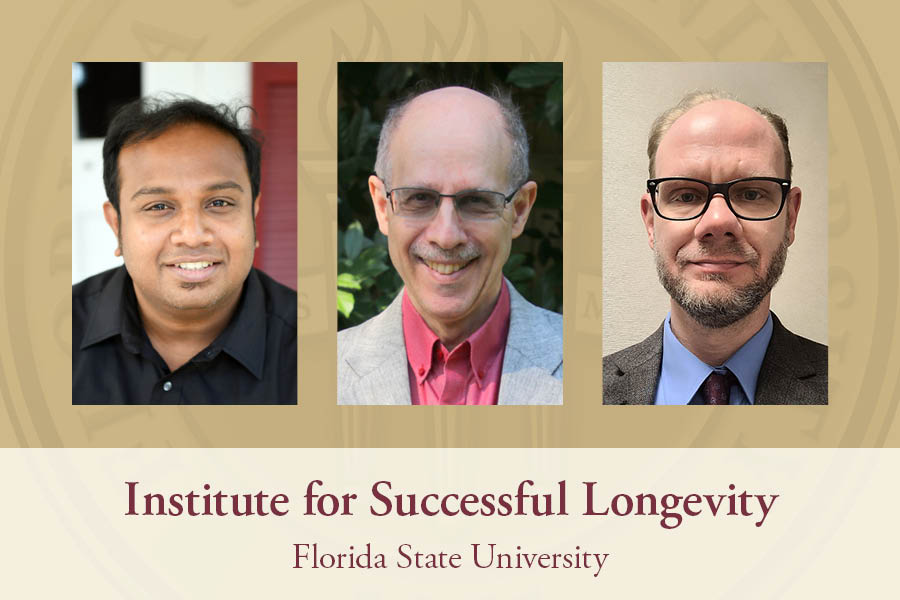
Florida State University researchers are part of a consortium that has been awarded a $14.7 million grant from the National Institute on Aging to work with emerging and existing technologies to promote the well-being, quality of life and independence of older adults and provide support for older adults with cognitive impairments.
Initially funded in 1999, the Center for Research and Education on Aging and Technology Enhancement (CREATE) aims to ensure that older adults can use and realize the benefits of technology for improving daily life. Led by the Weill Medical College of Cornell University, the consortium also includes Florida State, the University of Illinois at Urbana-Champaign and the University of Miami.
Professors of Psychology Walter Boot and Neil Charness, along with Assistant Professor of Computer Science Shayok Chakraborty, make up the FSU portion of the team.
Boot and Charness, who is also the director of the Institute for Successful Longevity, noted that through four previous versions of CREATE, the landscape of aging and technology has changed dramatically.
"The evolution of CREATE has been exciting, as the center kept pace with the rapid technological changes we've seen in the past 20 years," Boot said. "Our research questions and technology solutions have changed with the potential of emerging technologies."
Sara Czaja, professor of gerontology in medicine at Weill Cornell Medicine and CREATE's principal investigator, said the researchers at the four universities understand the role technology can play in helping older adults.
"Technology is increasingly being considered as a solution for the support needs of aging adults," Czaja said, "and more technology products are marketed to seniors."
Given that age is a significant risk factor for cognitive impairments such as mild cognitive impairment (MCI) and Alzheimer's disease and related dementias, CREATE V will expand its target populations to include older adults with MCI and involve three integrated cross-site projects.
With a focus on enhancing cognitive health, social engagement and preventing cognitive impairment, the first study will look at how virtual reality technology can be used to foster cognitive and social engagement among aging adults.
"The CREATE researchers are excited about the potential of virtual reality technology," Boot said, "because the technology is now sophisticated enough and inexpensive enough to support the implementation and dissemination of immersive interventions to promote social and cognitive engagement among older adults, including older adults at risk for social isolation."
The second CREATE V project will focus on providing support for adults with MCI, using innovative technologies to assess further cognitive decline, such as conversion to Alzheimer's disease or related dementias. The research team will collaborate with the IBM Watson Research Center to develop a speech analysis software support tool that will engage older adults in storytelling. The aim of the tool will be to help detect changes in cognitive status.
"At the FSU site of CREATE we have strong expertise in machine learning and artificial intelligence that will assist in the development of technology systems that will learn about and adapt to the user to make technology interactions easier, especially for older adults experiencing cognitive challenges," Chakraborty said.
The third research project will focus on developing digital assistant tools to help older adults with cognitive impairments manage health-care tasks, such as enrolling in Medicare/Medicaid.
All three large-scale research projects will be conducted across sites in New York, Florida and Illinois to collect data on a variety of characteristics from a diverse population of older adults. CREATE V will also include an expanded pilot research program to support new investigators.
"We are delighted to have support from the National Institute on Aging to co-develop innovative technology solutions with the help of aging people from our community," Charness said. "Our aim is to enhance well-being and social connectedness with well-designed technology solutions."
To amplify the collective understanding of aging adults and technology interactions, the researchers plan to broadly disseminate the findings, protocols and tools of CREATE V to a worldwide audience, including the research, business and design communities.
"Our specific aims are to understand how we can harness the power of technology to maintain, support and foster the emotional, cognitive and physical health of aging adults, to ultimately enhance their independence, well-being and quality of life," said Czaja of Weill Cornell Medicine. "These are complex issues, but it's very exciting."






